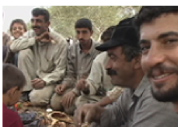
Every year during the planting and harvest seasons, Israeli, international and Palestinian activists from the International Solidarity Movement, Popular Struggle Coordination Committee, Ta’ayush, Rabbis for Human Rights, Israeli Committee Against House Demolitions, Anarchists Against the Wall, Torat Tzedek, Haqel and other NGOs “co-resist” Israel’s occupation and colonization of Palestinian land by working alongside West Bank farmers threatened by attacks from Israeli settlers and soldiers. The presence of Israeli and international activists working alongside Palestinians in their fields and olive groves provides witness to, and some protection from, human rights violations committed by Israeli settlers, and committed or allowed by Israeli soldiers. Working together also provides opportunity for intercultural/interfaith dialogue — “olive grove conversations” — that can enable mutual respect, friendship and solidarity in support of equal rights for all in Palestine/Israel.
In October 2002, Rida Said, a Palestinian farmer (foreground), had a conversation with an Israeli activist named Oded in which both men discussed their hopes and fears for justice and lasting peace, and acknowledged the history of oppression that both Palestinians and Jews carry due to the ongoing colonization and occupation of Palestine and the legacy of European racism against Jews. Both men valued the chance to share their culture’s vulnerability and pride with someone from “the other side,” an opportunity made possible by the trust-building context of working together in the olive grove.
The gist of their conversation, overheard by Rains Rouner who was picking olives with them, went like this:
Rida thanked Oded for participating in the olive harvest but pointed out that the presence of Israeli and international activists trying to protect Palestinians from Israeli settlers and soldiers wouldn’t be necessary if Israel ended it’s 1967 occupation. Oded acknowledged this was true but said that Israel justified its occupation as protection against Palestinian “terrorism.” Rida replied that Palestinians don’t believe this; they believe Israel is trying to steal the land.
“Why else would Israel continue building settlements?” Rida pointed out. “There were no Palestinian suicide bombers during the first intifada in the 1980s, when Palestinians threw stones to resist the occupation. Before there ever was a Palestinian suicide bomber, the Jewish ‘terrorist’ Barauch Goldstein killed 29 Palestinians and wounded 125 at the mosque in Hebron in 1994. Palestinian ‘terrorism’ is ‘resistance’ to Israel’s occupation and oppression. If the occupation ends and Palestinian rights are upheld, there will be no Palestinian terrorism.”
Oded replied that many Israelis don’t believe this. “You must understand,” Oded said, “even though we have a strong army, we are still very afraid. The Jewish people have a long history of oppression, you know.”
“I know,” Rida replied, “and Palestinians have a history of oppression also. For years we’ve been occupied by foreign armies — the Turks, the British, the Jordanians, and now you.”
“I understand,” Oded answered, “but when the State of Israel was founded, Palestinians didn’t accept us. You fought against us in ’48 and in ’67.”
“Yes,” Rida replied, “we fought against you like you fought against the British. We didn’t accept you at first, that’s true. But we do accept you now — that’s what you must understand. We accept your right to live on this land with us. President Arafat recognized the State of Israel in 1988, and again in ’93! The question is do you accept us? Do you accept our right to live on this land with you?”
Rida pointed across the valley to the sprawling, wall-enclosed city of Ariel settlement less than a mile away. “Look!” he said. “Look at Ariel! Israeli settlements in the West Bank are illegal according to international law! If there is to be an independent Palestinian state, Israeli settlements must be withdrawn. And if not, Palestinians must be granted equal citizenship in one united country where both our peoples will live together in equality and peace,” Rida paused, “like in the USA.” He watched Oded closely. “Israel is the stronger power, so Israel must decide,” he said. “Therefore let me ask you: As an Israeli Jew, do you want two sovereign, independent states or one state with equal rights for Jews and Palestinians?”
Oded didn’t answer.
“Israel is the stronger power,” Rida repeated. “Israel is the one who must either withdraw its settlements or grant equal citizenship for Palestinians.”
“That’s true,” Oded replied. “Israelis know this, but for years we’ve been trying to avoid this choice.”
“I know,” Rida answered, “but you can avoid it no longer.” He paused once more. “Your presence with us today shows you do support equality between Jews and Palestinians, so my question is for your people, and your government: Will Israel recognize the equal right of Palestinians to share the land of Canaan?”
“Insha’Allah,” Oded said.
“Insha’Allah,” Rida answered, and the two men shook hands.
“I will never forget our conversation,” Rida told Oded when we finished picking olives at the end of the day. “If more Palestinians and Israelis spoke honestly, without fear, our peoples would be able to understand and respect each other, and we could live together in equality and peace.”